Low Stomach Acid? 3 Ways to Tell & What to Do About It
In a hurry? Click here to read the Article Summary...
According to the National Institute of Diabetes and Digestive and Kidney Diseases, as many as 70 million people living in the United States (that’s more than 20% of the population) suffer from a digestive disorder [1]. And countless others experience periodic flatulence, acid reflux, heartburn, or indigestion – all potential signs of low stomach acid.
It’s a common misconception that low stomach acid symptoms are indicative of too much stomach acid. This misunderstanding is a key reason why the global market for antacid drugs is expected to top $18.7 billion by the year 2026 [2].
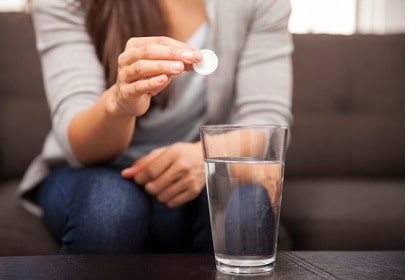
The reality of the situation is that folks who have trouble digesting their food in one way or another typically don’t have enough stomach acid, not too much. A lack of stomach acid means food festers there before eventually being passed on to the small intestine partially intact. (In case you haven’t guessed already, this is not a good thing).
Known clinically as hypochlorhydria, low stomach acid is a common health issue that afflicts upwards of 90% of the American population, according to health expert Dr. Jonathan Wright, MD [3]. In almost every instance where he’s tested patients over the age of 40 with reported symptoms of heartburn, indigestion, or gas, the culprit was usually inadequate acid production in the stomach.
Antacids & Proton Pump Inhibitors Can Make Low Stomach Acid Worse
What this means is that people who take antacids to eliminate their digestive woes are usually making the problem worse, even if symptoms seem to subside after taking them.
Proton pump inhibitors (PPIs) are even more egregious in that they inhibit the body’s normal production of stomach acid [4], creating a type of long-term low stomach acid syndrome where a person’s body is perpetually acid-deficient and thus ill-equipped for proper digestion.
Endlessly popping antacids or PPIs with meals can really do a number on the body’s ability to make and use hydrochloric acid, also known as HCl, the main form of gastric acid found in the stomach (alongside potassium chloride and sodium chloride).

Besides depriving the body of vital nutrients by inhibiting the complete breakdown of foods that contain them, these dangerous drugs – and especially PPIs – also come with an array of nasty side effects that end up triggering other potentially more severe health problems [5], as well as shut down the body’s natural production of HCl.
It’s a bit of a catch-22 because without antacids or PPIs, many chronic digestive sufferers are left to feel the burn. This burning sensation can come from:
- the acidic gas from failed digestion putting pressure on the stomach valve and burning its way into the esophagus, or
- the constant bloating from putrefied food blasting into the colon and wreaking digestive havoc.
It All Starts With Your Saliva
There has to be a better way, you’re probably thinking right about now – and the good news is… there is! As you’ve probably gathered, in order to effectively break down the foods you eat into smaller, more usable molecules, your stomach needs plenty of HCl, which has a pH level of zero [6]. This is considered baseline acidic, and it’s what’s required to really unpack everything you eat down to the molecular level, readying it for passage into the small intestine.
But this is only possible after your food has already been pre-digested by the saliva created in your mouth. As it turns out, saliva possesses a unique communications mechanism that tells your stomach in advance to start making more HCl before the food arrives.

If you’re not producing enough saliva, then you’re also not producing enough HCl – which consequently means your small intestine is not producing enough digestive enzymes to complete the process.
This cascading failure effect can manifest as any or all of the aforementioned symptoms, depending on your unique physiology and health state.
But it’s a lack of stomach acid that lies at the root of the problem, whether it’s caused by poor saliva production or some other trigger – we’ll get into this more later.
Your Stomach’s PH Needs to Be at the Right Level to Digest Your Food
The stomach’s resting pH level is ideally supposed to be somewhere in the range of 5.0 to 6.0, and this level has to drop to around or below 3.0 every time you eat – HCl being the primary functional mechanism for adjusting your stomach’s pH to that proper level.
When there’s a lack of HCl, the stomach’s pH level stays too high, and larger food particles sit there for too long and spoil, which can feel like the food you just ate is gurgling around for hours on end causing discomfort, pain, and bloating.
According to the Food Enzyme Institute [7], it takes about 45 minutes for a healthy stomach to drop from its resting pH range of 5.0-6.0 to 3.0 or below upon receiving food.
This means that whatever you eat needs to stay fresh for at least that amount of time in your stomach’s 98.6-degree environment in order to not go bad. Otherwise, your small intestine ends up receiving spoiled, partially intact, toxic food particles that cause problems rather than provide nutrition.
Stomach Acid Production Decreases With Age
Unfortunately, an unhealthy or older stomach takes even longer to digest food due to lower levels of HCl and other associated digestive enzymes. And when food repeatedly sits in this type of stomach for long periods of time, decaying and creating gaseous fumes that burn the esophagus and cause heartburn, as one prominent example, other more serious health conditions can emerge such as full-on esophagitis or irritable bowel syndrome.

Again, the medical establishment’s standard solutions – antacids or PPIs – only address the symptoms without getting to their root cause. And by reducing stomach acid even more (the exact opposite of what a digestive sufferer actually needs), these drugs can potentially cause more harm than good by allowing poorly digested food particles to enter the small intestine, where their noxious presence generates inflammation.
This inflammation often manifests symptomatically as bloating due to the membranes of the intestinal wall becoming inflamed and swollen. And as this swelling occurs, the intestinal wall becomes more permeable than normal, allowing inadequately digested food particles to enter into the body uninhibited – a dangerous phenomenon known as leaky gut (aka intestinal permeability).
Besides rotting food particles, other damaging substances such as chemical preservatives, pesticides and herbicides, and antibiotics also pass through the intestinal membrane, toxifying the body to an even greater degree.
But keep in mind that pretty much all of this can be avoided simply by supporting healthy stomach acid production.
The Most Common Stomach Acid “Killers”
How do you support healthy stomach acid production, you’re probably asking? It all starts with optimizing your lifestyle by ridding it as much as possible of stress, worry, and anxiety – three stomach acid killers.
Being in a constant state of “fight or flight” can wreak absolute havoc on your digestive system because it forces your body into survival mode. This means that vital resources are diverted away from creating the stomach acid necessary to digest your food, and towards mitigating the “emergency” situations that it thinks you constantly face.

If you’ve ever crammed down a meal while you were feeling stressed and then had it feel like you had a “rock” in your stomach all day… now you know why. Your food can’t digest properly when you’re stressed!
Learning how to remain calm and collected at all times, no matter the circumstances, will go a long way in keeping you healthier than you ever thought possible.
Training your mind to better adapt to unexpected or unpleasant situations will communicate to your body that it’s okay to spend its resources on nourishment, growth, and well-being rather than on terror, distress, and the felt need to constantly escape from the problems of life.
Adaptogens Create Balance in the Body
There are supplemental ways to enhance this process, one of them being adaptogens. Adaptogenic herbs directly counteract the negative physiological changes brought about by stress.
Because they naturally help to normalize the body and create homeostatic equilibrium, adaptogens have been scientifically shown to help protect your body against neurological, endocrine, and immune damage while balancing your hypothalamic, pituitary, and adrenal glands [8].
There are many adaptogens including ashwagandha, cordyceps mushrooms, l-theanine, lemon balm, chamomile, and cannabis sativa [9] to name just a few. When used properly, these plants can help to calm and balance your nervous system, ensuring that stress levels stay at a minimum.
Keep in mind that the bulk of your immune system – upwards of 70% [10] – lives inside your gut. Thus, if your stomach isn’t properly digesting your food, allowing toxic food particulates to constantly bombard your small intestine generating inflammation and a leaky gut, then you’re simply not going to be healthy no matter what else you try to do for your health.
3 Ways to Know If You Have Low Stomach Acid
Even if you don’t think you have low stomach acid or digestive problems, it’s important to keep in mind that symptoms aren’t always obvious. Sometimes they’re too subtle to be noticeably disruptive, or perhaps sufferers simply get used to them because of their constant presence in everyday life.
Look at Your Fingernails
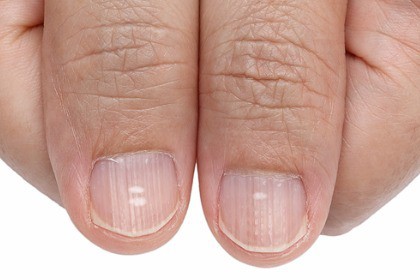
If this sounds like you, try inspecting your fingernails to see if they have any white spots or vertical ridges – meaning ridges or lines that run from the cuticle to the tip of the finger. According to the Oriental medicine tradition [11], white spots on nails and vertical ridges on nails could be indicative of underlying gut dysbiosis or gut inflammation, as well as an associated nutrient deficiency.
The Baking Soda Test
There’s also the home baking soda test [12], which involves mixing a quarter teaspoon of bicarbonate of soda (baking soda) into about six ounces of water and drinking it first thing in the morning on an empty stomach.
If your stomach acid levels are normal and healthy, you should start burping within the first 2-3 minutes. If five minutes elapse and you still haven’t burped, then you could have low stomach acid – even if symptoms aren’t noticeable (for the best results, conduct the home baking soda test multiple days in a row).
Ask Your Doctor for a Low Stomach Acid Test
If you’re still not sure where you stand or want a second opinion, you may want to consider opting for a practitioner-administered low stomach acid test [13], which may involve a doctor having you swallow a transmitter capsule that tracks and reports the amount of acid in your stomach.
Natural Remedies for Hypochloridria
If it turns out that you do have low stomach acid (hypochloridria), there are some steps you can take. (Note: always consult with a qualified healthcare practitioner, especially if you have existing medical conditions.)
Supplemental HCl

One quick fix to these digestive woes would simply be to supplement with HCl, which can be easily and affordably purchased at pretty much any health food store.
The drawback with this approach is that it merely addresses the symptom of low stomach acid without getting to the root cause of why your body isn’t making enough of it in the first place.
Are You Making Enough Saliva?
Since it all starts with your saliva, an even better approach is to investigate whether your body is making enough of it – and if not, why?
- Are you thoroughly chewing your food before swallowing it?
- Are you eating the right foods at the right times, and in the right combinations?
- Are you staying properly hydrated?
Remember: your stomach’s HCl production is partially a factor of how much saliva your mouth is producing. Furthermore, the effectiveness of HCl in your stomach is largely dependent upon how effectively your saliva has already broken down the food it’s receiving – not to mention the fact that saliva protects the esophagus from being damaged by stomach acid [14].
Increase Your Natural Saliva Production
Bitter herbs have been scientifically shown to help naturally increase saliva production [15]. Some common examples of bitter herbs are:

- Andrographis
- artichoke
- barberry
- bitter melon
- bitter orange
- blessed thistle
- boldo
- centaury
- dandelion
- devil’s claw
- elecampane
- gentian
- ginger
- goldenseal
- greater celandine
- horehound
- juniper
- Oregon grape
- picrorhiza
- prickly ash
- vervain
- wormwood
- yarrow
- yellow dock
Mixing just a few drops of one or more of these bitter herbs into water and sipping them slowly 10-30 minutes before you eat could be all that it takes to give your digestion that optimization boost it needs.
Tip: many health food stores sell combination bitter herb tinctures that provide a maximum entourage effect, and there are also powerful recipes out there that you can make at home [16].
Other herbs and foods that are known to help increase saliva production include:
- cayenne pepper
- apple cider vinegar
- lemon juice
- iodine
- fulvic acid
- proteolytic enzymes (which unlike HCl won’t inhibit your body’s natural ability to produce its own enzymes, but will rather enhance it)
Closing Tips for Improving Digestion
You’ve now learned that too low stomach acid (versus too much acid) is a common problem and that constantly popping antacids can oftentimes be causing more harm than good.
The solution is to work with a qualified healthcare provider to determine if you have low stomach acid, and if so, what steps you should take to address it. Additionally, the following tips for optimizing digestion are beneficial for almost everyone:
- chewing your food thoroughly, meaning slowly and steadily until it’s lost its texture and is almost liquified before swallowing.
- consuming less processed food that lacks enzymes and eating more enzyme-rich foods.
- eating cultured and fermented foods like kefir and sauerkraut that contain digestion-optimizing probiotics.
- avoiding known allergens like wheat and soy that can exacerbate digestive problems.
Organixx Enzyme 17 contains a whopping FIVE kinds of powerful protease enzymes in combination with one of the most advanced enzyme blends on the planet. It’s scientifically designed to help your body break down and process nutrients for better absorption, digestion, and overall health.
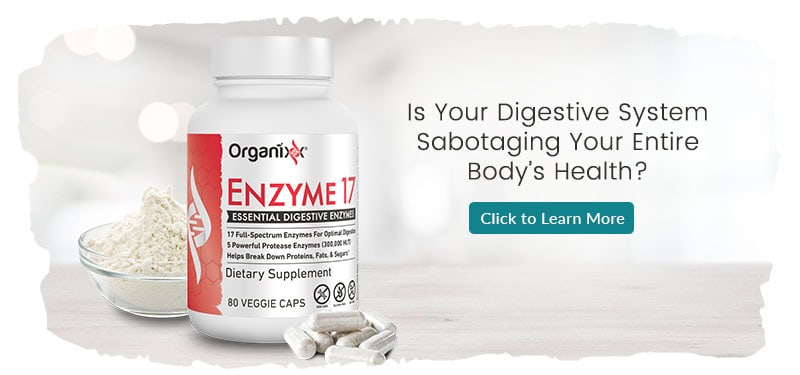
 Sources:
Sources:
Article Summary
It’s a common misconception that low stomach acid symptoms are indicative of too much stomach acid. People who have trouble digesting typically don’t have enough stomach acid, not too much.
Known clinically as hypochlorhydria, low stomach acid is a common health issue that afflicts upwards of 90% of the American population.
Endlessly popping antacids or PPIs with meals can negatively impact the body’s ability to make and use hydrochloric acid, the main form of gastric acid found in the stomach.
When there’s a lack of HCl, the stomach’s pH level stays too high, and larger food particles sit for too long and spoil.
Unhealthy and older stomachs take even longer to digest food. When food repeatedly sits for long periods of time in the stomach, it decays and creates gaseous fumes that burn the esophagus and cause heartburn.
Stress, worry, and anxiety are three stomach acid killers.
Adaptogenic herbs directly counteract the negative physiological changes brought about by stress. There are also ways to increase natural saliva production for better digestion (see article for details).


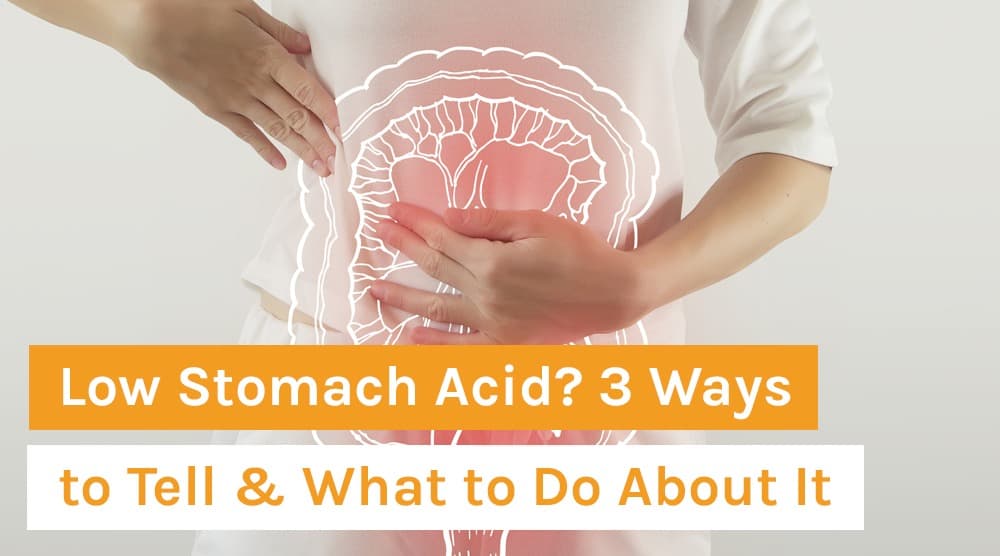
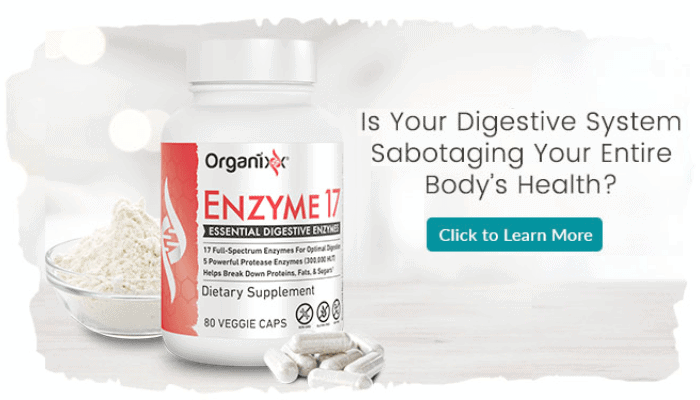

I'm currently using Organixx P3E Advanced Enzyme Formula. Is it still good? Did the Organixx Enzyme 17 take the place of P3E?
Hi Michael, This is a great question. We have changed the name of our popular and highly acclaimed P3E product to Enzyme 17.
But while the name is changing, the powerful ingredients stay the same! But why have we changed the name to Enzyme 17?
Quite simply, the product identity is now in full view. We feel that the name "Enzyme 17" makes it a bit more understandable on what our product is by highlighting the 17 different enzymes that make up the most advanced enzyme formula on the market today.
If you'd like to learn more about Enzyme 17, we invite you to visit our website at https://shop.organixx.com/products/enzyme-17 Have an awesome day! :)
Please send more info. Thx.
Hi Robin, thanks for your comment.
We're happy that you found this article informative and that you'd like more information on the topic. If you would like to save a copy of the article for your reference, you may do so by either printing it or saving it to your computer or mobile device by clicking ctrl (+) P.
With that said, we'd love to share some information with you regarding our very own Organixx Enzyme 17. Enzyme 17 is the most cutting-edge and powerful digestive enzyme formula on the planet. It’s scientifically designed to help your body break down and process nutrients for better nutrient absorption and gut health, increased energy, and better overall health. Regardless of the type of diet, you’re currently eating – this formula will help your digestive system extract far more nutrients from your food.
For more details, we encourage you to check out the following link: https://shop.organixx.com/collections/digestion-detox/products/enzyme-17
We hope you find this helpful and wish you a happy & healthy day!
Hi, eleven weeks ago, I was diagnosed with GERD. I tested myself for H. pylori and various other parasites as well as for pancreatic insufficiency but the results were negative. I also had a blood test indicating vitamin D3 deficiency and vitamin B12 latent deficiency.
My symptoms include burping after eating, acid moving up into my esophagus and a feeling of something being stuck somewhere along my digestive system that I feel in my back. My GP and two other gastroenterologists prescribed me Almagel (antacid), Zirid (Itopride) and PPIs which I took for 5 weeks. Because I wasn’t getting better, my doctors prescribed me increasing amounts of medicine. Towards the end of this period I was taking 80 mg of Nexium per day. However, as I was taking the medicine my symptoms worsened. I lost 8 kg because I was barely able to eat. I felt that food stayed in my stomach for hours before it got digested. After 5 weeks I decided to stop the medication as I read that my condition may be due to low stomach acid. Although I had some rebound acid after stopping the medication, the rebound effects stopped after 2-3 days. I began taking Slippery Elm, herbs /germander, chicory/, propolis with royal jelly, honey and bee pollen. I started eating a little more, I found foods which I tolerated /honey, apples, pears, melons, chicken broth, kefir, carrot juice. Other foods such as egg whites, pickles, avocados, rusks in water were hard for me to consume but I found that I can eat them if I also took some apple cider vinegar. I think apples cider vinegar relieved to a big extent many of my symptoms. Unfortunately, apple cider vinegar is causing pain in the epigastric region after I take it, so I have stopped consuming it. I also tried celery but I got reflux from it.
I believe I might have gastritis accompanied with low acidity as the moment I eat foods with protein or fats, I get reflux and burping, yet when taking ACV to ease the digestion, it is causing irritation in the epigastric region. I tried taking plant based enzymes but even with them, when I eat 20 grams of boiled chicken, I still get reflux. I read online about gastritis and they mention it is treated with PPIs. However, this does not make sense to me as I can't see how this will help me digest proteins and fats; currently I am not able to eat any foods with protein or fats.
In your article you mention the use of HCL, but given even apple cider vinegar causes issues, I was wondering if you could suggest any alternative. In addition, my current diet is quite sugar and carbohydrates heavy (honey and fruits mainly), so I was wondering if you could suggest any foods that you think I should try given the digestion issues I mention above.
Hi pav2021,
I'm not a doctor of any sort. But I've had many of the same symptoms you are describing, so I thought I'd share what I have learned for myself. Besides the low stomach acid issue, I found out that my body also has a hard time making bile. Bile is necessary for digesting and utilizing fats. Have you looked into whether your body is efficient in making bile?
I also had a genetic test done that showed that I have genetic mutations on the genes responsible for making choline. The body needs choline and taurine to make bile. So I can't make choline on my own, thus no bile, thus no fat digestion. So I've been working with my doc on addressing that. And I also have been diagnosed with SIBO(small intestinal bowel overgrowth). My doc says that can also account for many of my symptoms.
I don't know if any of that info would help you, but I thought I'd mention it! Btw, Apple cider vinegar used to work great for digestion for me, too...until it started bothering my esophagus.
Hope you find your solutions,
Jaime
Hi pav2021, thank you for sharing your health journey with us. We would be more than happy to provide you with some information to help you make an informed decision.
If it turns out that you do have low stomach acid (hypochloridria), there are some steps you can take. (Please note, we always advise consulting with a trusted health care practitioner 1st, especially if you have an existing medical condition.)
As you know, it all starts with your saliva. Your stomach’s HCl production is partially a factor of how much saliva your mouth is producing. Furthermore, the effectiveness of HCl in your stomach is largely dependent upon how effectively your saliva has already broken down the food it’s receiving – not to mention the fact that saliva protects the esophagus from being damaged by stomach acid.
Bitter herbs have been scientifically shown to help naturally increase saliva production. Some common examples of bitter herbs are:
- Andrographis
- artichoke
- barberry
- bitter melon
- bitter orange
- blessed thistle
- boldo
- centaury
- dandelion
- devil’s claw
- elecampane
- gentian
- ginger
- goldenseal
- greater celandine
- horehound
- juniper
- Oregon grape
- picrorhiza
- prickly ash
- vervain
- wormwood
- yarrow
- yellow dock
Mixing just a few drops of one or more of these bitter herbs into water and sipping them slowly 10-30 minutes before you eat could be all that it takes to give your digestion that optimization boost it needs.
TIP: Many health food stores sell combination bitter herb tinctures that provide a maximum entourage effect, and there are also powerful recipes out there that you can make at home.
Other herbs and foods that are known to help increase saliva production include:
- cayenne pepper
- lemon juice
- iodine
- fulvic acid
- proteolytic enzymes (which unlike HCl won’t inhibit your body’s natural ability to produce its own enzymes, but will rather enhance it)
P3E from Organixx contains FIVE kinds of powerful protease enzymes in combination with one of the most advanced enzyme blends you'll find out there. It’s scientifically designed to help your body break down and process nutrients for better absorption, digestion, and overall health.
Feel free to get all the details here: http://bit.ly/p3e-shop-comm2-fb
We hope you find this information helpful and wish you all the best on your health & wellness journey!
What isorganixx is goodforDigestionandlowacid
Hi Peter, thanks for your question!
Organixx actually carries a few supplements that are formulated for Digestive and Gut Health. We would love for you to learn more about them here:
https://shop.organixx.com/#digestive-gut-health
Please feel free to check out their respective ingredients, formulation, health benefits, and customer reviews to help you determine which one would work best for you and your health needs.
Wishing you the best in your wellness journey!
would like to learn more about leaky gut and dietary supplement to help digestive enzyme and would like coupon
Hi Laura, thank you for your interest in Organixx!
Please feel free to visit our online store to browse our supplements formulated to support healthy digestive/gut health:
https://shop.organixx.com/#digestive-gut-health
Thank you and we wish you a lovely day!